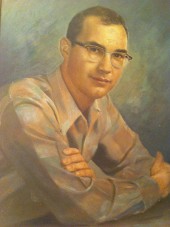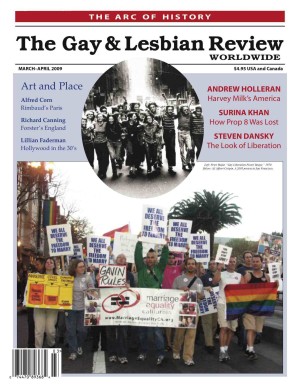 March 3, 2009.
March 3, 2009.
The cover alone of the March/April 09 issue of The Gay & Lesbian Review, featuring contrasting pictures of two gay marches, is great history.
My first thought is: Can you tell us where the people in both pictures are today and how they view the world today? The idea of a picture of early gay lib days, the great Come Out picture (1970, New York) and the more recent picture of people in California marching in 2005 for marriage, is great visual history of the homosexual community/movement.
And the article “The Look of Liberation,” by Steven Dansky, and the additional pictures should put this part of Stonewall history in place for future generations. I do wonder about the continuing disagreement on the term to describe the event — riot versus revolution. (I cannot understand the places in the picture versus the names, but to see names such as Jim Fouratt makes this still relevant today.)

It could be another philosophical discussion on tactics, etc., when you think that the Come Out!! picture was staged and some people think only “spur of the moment” things are valid — and yet the actual photo is almost accidental and so even more valuable as at another second it could have been just another picture. And that some people are not in the picture, such as Allen Young, and others almost weren’t, such as Ron Ballard, makes it of interest as it tells us of how people had to deal with being “out” then. And the pictures that record such things as the Effeminist Manifesto, with Kenneth Pitchford, et al., show that much was happening.
I personally was happy to see that even the people at events then now can not remember all that happened, even where the picture was taken or which house a meeting was held in, as I have the same lack of specifics on what happened, where, when, etc.
Let’s hope the people in the 2005 picture and the events since Prop 8 protests, etc. will keep a record. And the article on Milk was valuable for the same reasons, to know the general atmosphere in San Francisco then as compared with today is important.
I also liked that Lillian Faderman, in “How ‘Gay’ Were the Stars of the ’30s,” tries to keep reality in how Hollywood really was in those early days. Some people try to make it sound gayer than it really was, and that distorts history. I wonder why Brett Abrams in Hollywood Bohemians tries to make us think stars were out and life was easy when it was not?

